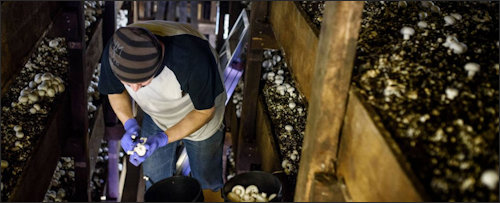
Pennsylvania mushroom farm. Photo credit: Wall Street Journal
We’ve all heard the mushroom theory of management — shovel s*** and keep ’em in the dark. Well, brace yourself for Bacon’s mushroom theory of economic development.
Almost half of America’s mushrooms are produced in Chester County, Pa. After peaking in 2014, however, production has declined slightly in recent years. A big problem: a labor shortage. Reports the Wall Street Journal:
Most mushroom growers have failed in efforts to recruit locals for harvesting jobs, which can bring in as much as $50,000 a year but often require workers to start by 5 a.m. and put in six days a week.
“We’d love to get people who live in this area,” said Meghan Klotzbach … regulatory manager for Mother Earth. “They graduate from high school, they just go to Wal-Mart to work. Why can’t you come here and pick mushrooms?”
Chester enjoys no natural advantages in mushroom growing, which takes place indoors, in the dark, using composted soil. The concentration of the industry in this one Pennsylvania County is a historical curiosity, dating back to two Quaker flower growers in 1885 who discovered they could use wasted space under their carnation beds to grow mushrooms. The region maintains its dominance in part due to an elaborate supply chain that funnels large volumes of manure to the farms. But mushrooms can be cultivated anywhere.
Indeed, they are grown in Virginia. A quick Internet search reveals at least three mushroom farms: North Cove Mushrooms in Charlottesville, Sharondale Farm in Cismont (near Charlottesville), and Urban Choice, which is located in the Scott’s Addition area of Richmond.
The Virginia mushroom farms are small enterprises that sell mainly to farmer’s markers and local restaurants. If labor is a constraint in Chester, Pa., why can’t Virginia farmers take up the slack? Wouldn’t $50,000 a year sound like good money to workers in rural Southside and Southwest Virginia (or for inner city workers in Richmond)?
The Washington, Hampton Roads and Richmond metropolitan regions represent a vast market for fresh, locally grown produce of all kinds. Rural Virginia needs more, better-paying jobs. Mushroom cultivation could fit the bill. Find a couple dozen niche agricultural products like mushrooms, and we could see a rural revival in the state.
Just a thought….


